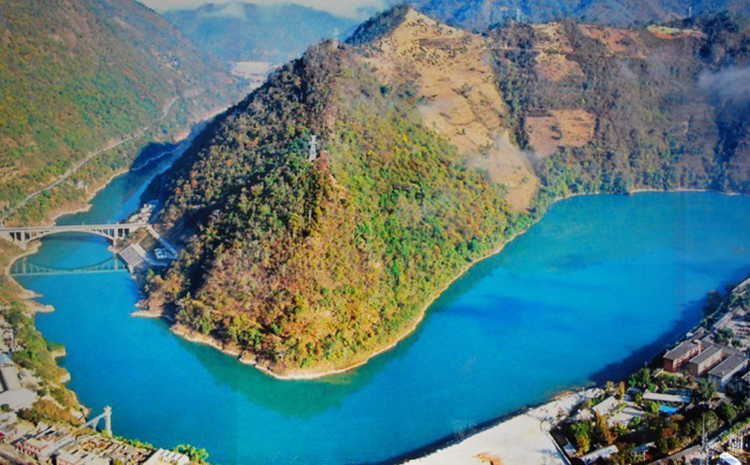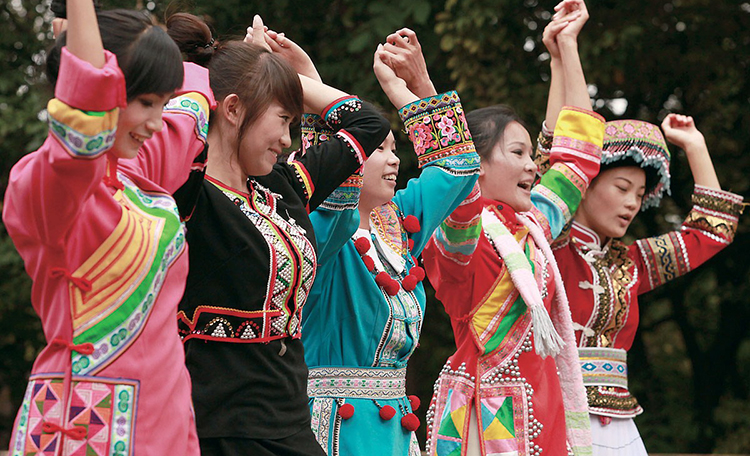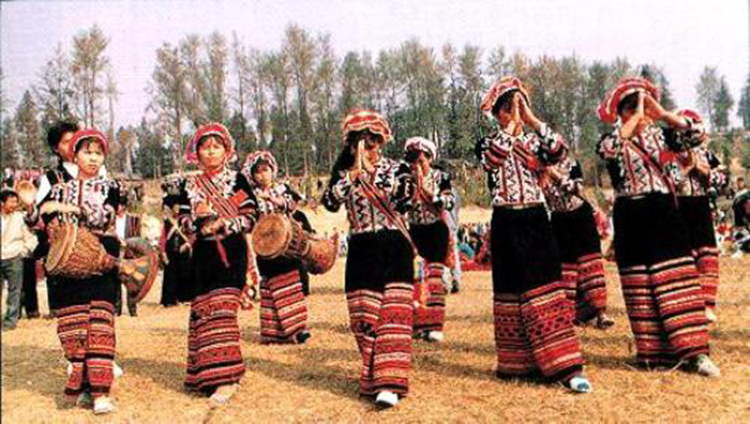Written by: Li Long
Posted on: August 18, 2015 | 
Lahu people
Lahu people have their spoken and written language which belongs to the Yi school of Han-Tibetan Language Family. Attributed to frequent communication with Han and Dai people, a majority of them can also use Mandarin and Dai language. In recent history, some Lahu adopted Latin scripts created by Western missionaries, which were taken as the basis for the recreation of new phonetic language in 1957. Lahu people have extremely colorful folk literature. Their traditional musical instruments include a reed-pipe wind instrument called Lusheng and a three-stringed instrument called Sanxian.
Besides growing crops, Lahu people extensively grow sugar canes, tea trees, coffee beans and rubber. Industries of steel-making, agricultural machinery and mining, such as the famous enterprise of Yunan Lancang Lead Ore Mine, have been established in the past years.

Traditionally, Lahu people eat only two meals a day with rice as the main staple, and corns, potatoes, beans, etc. as supplementary foods. They like carrots, green vegetables and melons, and are especially fond of peppers. Lahu people are very hospitable: neighbors are always invited to join their holiday feasts regardless of their ethnicities, such as Dai, Hani or Bulang. The best treat is “Chopped Fresh Meat” made with fresh slaughtered cattle. Chopped into small dice, the meat is combined with some intestines and spoons of fresh blood and served with salt and chili pepper. For daily cuisine, they usually put vegetables, meat and spices into a fresh and thin bamboo tube and boil them together in the water. The special scent of bamboo mixed with the natural aroma of the food makes the meals really tasty. The Lahu people also like roasted meat: the newly hunted wild prey is grilled directly on the fire or wrapped in banana leaf and buried in the fire. Lahu people are experts when it comes to making pickled meat and vegetables, as well as tofu and wine. Both men and women are fond of drinking, regardless of age. They make teas in a special way, by toasting the tea leaves in a jar until a light burning smell spreads, and then pouring water into the jar and making the tea.
Lahu people have their distinctive ethnic costumes as well. Traditionally, men wear a black turban on their heads, a long gown with no collar, and long trousers with wide legs. Women wear a long headcloth (with its tail falling down from the back to the waist). The female gown has a very long pleat with colored geometric design or strips of decorations on both the collar and the pleat. Silver beads are also used as accessories, from the collar to the placket. In places where communication with Han and Dai people are frequent, they wear costumes of Han and Dai people as well.
Lahu people use woods and bamboos as the main frame, as well as poles for their houses. Generally, there are square and oval-shape houses with a pitched roof for small families, but there are larger house as well, which may be supported by 12 to 21 wooden poles, with several separated rooms inside. Influenced by Han or Dai culture, they build houses with walls of mud bricks, with hay or wood block as the ceiling.

Lahu people have several traditional holidays, such as Lahu New Year, i.e. the Spring Festival, Torch Festival, Moon Festival and New Harvest Festival, etc. Preparation for the New Year starts from autumn, when men get their prey ready after hunting, and slaughters of poultry cannot wait until the start of the next year. Shortly before the Spring Festival, every family makes Baba (rice cakes) in different sizes and shapes. The big ones symbolize the sun and moon, and small ones, stars and harvests. Baba is placed on the production tools also, to imply that they should share the happiness and celebration of the Festival with their masters as well.
The Lahu people uphold the tradition of “no blood, no meat”; thus each host shares intestines and fresh blood with every household in his village during the festival slaughter. There are several rules that must be obeyed during the Spring Festival. On the first morning of the New Year, the celebrations of singing and drinking do not start until all the young men have fetched the “new water” from local mountain springs with gourd containers or bamboo tubes back to the village. According to legend, Lahu ancestors were born in the gourd. The new water carried in the gourd container is for the young and old, male and female, to wash their hands in order to wash away the poverty and hardships faced in the previous year, and welcome the harvest and happiness of the coming one. No visitors from other ethnicities are welcomed on the first day of the New Year, and guests who arrive before the New Year are not allowed to leave either. Only blessed words and expressions are allowed on New Year’s Day, in order to keep away any bad luck. Male and female guests cannot stay in the same bedroom, even when seeking to lodge. Dogs are especially cherished by Lahu villagers, and violence towards dogs is never tolerated. Eating dog meat is also prohibited.
In the New Harvest Festival, young men and women pick up some plum-earned rice and early-ripe corns from the fields to make meals and invite relatives and friends to share the food with them. When the guests arrive, wine and tea are served. The host takes the first cup before the guests to express his/her sincerity, and ease the worry of the food containing poison.

Before the 1950s, Lahu people believed in a kind of primitive religion, worshipping multi-gods, such as the gods of heaven, earth, thunder and natural timing, etc. They believed that everything had an affiliated spirit, and natural phenomena such as the sun, moon, stars, wind, rain, lighting and thunder were all dominated by gods and their spirits. Hence, nature was worshipped for a long time. Later, they converted to the Mahayana Buddhism, where ancestors were prayed to on important holidays and occasions. Before the rituals, body clearance and a change of clothes was always necessary. The sacrificial ceremony was guided by special personnel, and sacrifices were distributed evenly to every household afterwards, in order to ensure that everyone enjoyed the blessings and the fortune.
Lahu people are good at singing and dancing, based on their daily lives with a distinctive ethnic style. Lahu folk songs have five categories: praises, narrations, children’s songs, love songs and funeral songs, etc. Their music is in various melodies with multiple rhythms played by instruments such as the Lusheng (reed-pipe wind), Oral String, Sanxian (three-stringed), gong, vertical bamboo flute, etc. Most of their dances have actions and movements drawn from labor and production, such as the traditional Lusheng Dance, Rice Plantation Dance, Harvest Dance, Threshing Crops Dance, Peacock Dance, etc. They also learn from the Dai people and create their own Waving Dance with their own features. The major form of Lahu folk literature is their oral literature in many styles, reflecting their labors and lives vividly. The long epic “Nubamiba” is an important work to study their history of economic lives, primary mining, marriage and migration.
Lahu people support monogamy, and marriage with other ethnic groups is prohibited. Arranged marriage is seldom seen nowadays, although parents do intervene in the opinions of the young. Young people can find their true lovers freely, with the approval of their elders.
You may also like: